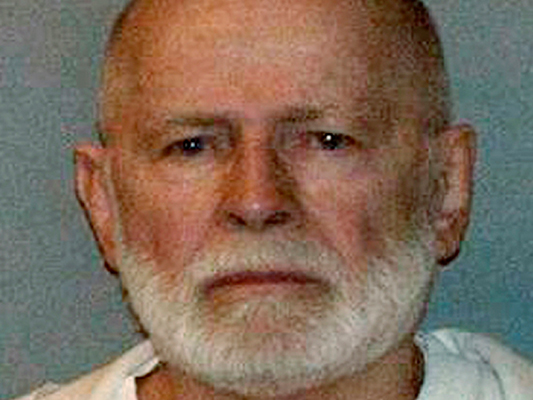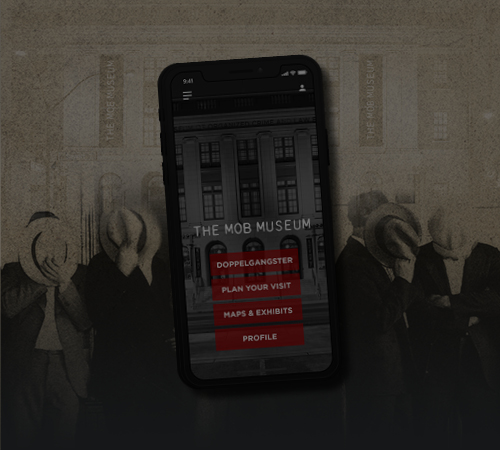Whitey Bulger

Born: September 3, 1929, Boston, Mass.
Died: October 30, 2018 in a federal prison in Bruceton Mills, West Virginia
Nicknames: Whitey, numerous aliases
Associates: Winter Hill Gang, Patriarca Family, the FBI
James Joseph “Whitey” Bulger was the boss of the largely Irish Mob in Boston from the 1970s through the 1990s. His longevity and success in organized crime largely can be attributed to protection he received as a high-level FBI informant.
Bulger was notorious for his readiness to use violence and especially murder to achieve his criminal goals. A “Southie,” or resident of the tough streets of South Boston, Bulger was attracted to street crime early in life, joining gangs and earning his first arrest at age 14, which sent him to the reformatory. Bulger’s brothers would go a very different direction. One of them, William Bulger, would serve as a member of the Massachusetts Senate for 25 years and president of the University of Massachusetts for seven years.
Whitey, however, as a young man was in and out of jail for various assault and theft charges, including military charges during his stint in the Air Force from 1948-52. In 1956 he was convicted of federal charges of hijacking and did his first stint in federal prison, landing in penitentiaries in Atlanta, Alcatraz, Leavenworth and Lewisburg.
While in the federal system, Bulger volunteered for experiments in which the CIA dosed prisoners with the hallucinatory drug LSD and other drugs in return for lesser sentences.
Bulger was released in 1965, and he went to work for a local Irish-American gang at a time when rival factions were at war. Bulger, with the Killeen gang, committed his first homicide during this war. In a case of mistaken identity, Bulger shot and killed the innocent twin brother of a rival gangster.
According to some biographers, Bulger switched sides and killed the leader of his old gang, although this is disputed by other sources. What is not disputed is that by 1972, Bulger and his new allies in the Mullen gang were top dogs among gangsters in Boston. During this period, Bulger cemented his reputation for violence by using murder as a means of discipline for wayward Mullen gang members. He was implicated in the deaths of at least three of his cohorts.
In 1979, the boss and deputy of the Winter Hill Gang, as it became known, were arrested for fixing horse races, and Bulger took over the gang’s leadership.
What few knew at the time was that Bulger had been an FBI informant since at least 1974. Bulger worked with FBI agent John Connolly, who grew up in South Boston and went to school with Bulger.
Bulger also worked closely with another FBI informer named Stephen Flemmi, also in the Winter Hill Gang, who had first been recruited by the bureau in 1965.
Connolly proudly affirmed his acquisition of high-level informants from the Winter Hill Gang who would help him take down the Italian Mafia. Connolly represented the FBI’s obsession with Italian-American crime families, and Bulger fed a steady stream of information on the Patriarca crime family based in nearby Providence, Rhode Island. Patriarca family members were sometimes allies but often rivals with the Winter Hill Gang, and the FBI essentially sided with the South Boston gang in their competition.
It was later revealed in court that Bulger was not indicted along with his fellow gang members in 1979 because Connolly intervened to protect his informant.
In the early 1980s, Bulger continued to operate the Boston rackets with impunity while he accumulated more experience with murder, including the killing of a completely innocent man who happened to be giving a lift home to one of Bulger’s targets. Bulger, in that murder, was wearing a hat and a long-haired wig when he shot at the car.
In the 1980s, Bulger started shaking down narcotics distributors and supplying weapons to the Irish Republican Army, which was fighting the British government in Northern Ireland. According to biographers, Bulger kept a sort of code around his involvement in narcotics, refusing to allow heroin to come into South Boston, for example. In 1991, Bulger muscled himself into a share of a $14 million winning lottery ticket from the legal lotto, a ticket that was sold in a store he controlled.
Outside of the FBI, law enforcement investigators by this time were convinced that Bulger was a top criminal whose was responsible for some of the most vicious murders in Boston. In 1994, the Drug Enforcement Administration, the Massachusetts State Police and the Boston Police Department launched an investigation and, accurately believing the FBI had been compromised, kept the bureau out of the loop until arrests were imminent.
In December 1994, Connolly helped his informant one last time and told Bulger that arrests were coming. Bulger fled Boston, but his high-level associates in the gang were arrested.
Bulger spent the next 16 years on the run as a fugitive. Joining him for much of that time, beginning in 1999, was his girlfriend, Catherine Greig. During his time as a fugitive, Bulger traveled frequently and was reported in Southern California; Vancouver, British Columbia; and London. He and Greig ultimately were arrested in 2011 outside a townhouse in Santa Monica, California, a few blocks from the beach.
Bulger was arraigned on July 6, 2011, on 48 federal charges, including 19 charges of murder. Two years later, a jury found Bulger guilty of 31 counts and he was sentenced to life in prison, plus five years.
Connolly, Bulger’s childhood friend and FBI protector, was indicted in December 1999 of feeding confidential information to Bulger and Flemmi, lying in FBI reports and taking bribes. Other racketeering charges soon followed. Connolly was convicted in 2002 and sentenced to 10 years. In 2008, Connolly was convicted of second-degree murder for another one of Bulger’s victims, in Florida 26 years earlier. He was sentenced to 40 years on that conviction, guaranteeing that Connolly would spend the rest of his life in prison.
After his conviction, Bulger served time in several federal prisons, with the longest stretch in Coleman, Florida. On October 30, 2018, Bulger, 89 years old and using a wheelchair because of a hip injury, was killed just hours after he arrived at the Hazelton federal prison in West Virginia. Fellow inmates beat him to death using a padlock stuffed inside a sock. Bulger’s eyes also appeared to have been gouged out.
One of his assailants, according to prison officials, was Fotios (“Freddy”) Geas, a Mob hitman from the Springfield, Mass. area. Geas, serving a life sentence for the 2003 murder of a member of the Genovese crime family, was widely known to despise “rats” – those who cooperate with law enforcement. Another suspect was Paul DeCologero, another Boston mobster serving a 25-year sentence for racketeering and conspiracy that led to the 1996 murder and dismemberment of 19-year-old Aislin Silva.
After Bulger’s death, the FBI was investigating the homicide, including how the inmates were able to gain access to Bulger’s cell.
When news broke about Bulger’s death, some family members of his murder victims celebrated. “All I really wanted to do was get that champagne bottle and pop that cork,” Patricia Donahue, whose husband, Michael Donahue, was killed in a 1982 shooting linked to Bulger, told the New York Times. “It’s been a long time waiting. Now my family can relax a little bit, now that we don’t have to worry about hearing his name all the time.”




